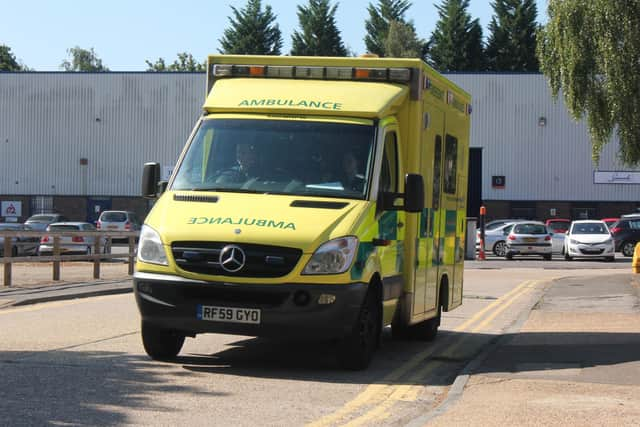Sussex residents urged to use NHS 111 online
and live on Freeview channel 276
The plea comes from local South East Coast Ambulance Service NHS Foundation Trust (SECAmb) leaders.
The 111 online service offers patients quick advice on the best option for them to get the care they need, including getting a call back from a trained clinician or nurse, booking them an appointment in A&E or providing advice on how to help them recover.
Advertisement
Hide AdAdvertisement
Hide AdSECAmb handled 25,599 calls last week (July 16-23) – an average of more than 3,600 calls a day and some 24 per cent higher than a similar July week in 2019 before the pandemic.


Patients are also being urged to only call 999 back if their condition worsens – not to check what time their ambulance will arrive.
SECAmb medical director Dr Fionna Moore said, “Our frontline ambulance crews, 999 and 111 call handlers and our dedicated volunteer community first responders are all working extremely hard to ensure we respond to patients as quickly as possible as we see increased demand for our services.
“As ever, we are prioritising our response to patients who are most sick and severely injured.
Advertisement
Hide AdAdvertisement
Hide Ad“Everyone who needs an ambulance will get one, however there are other and often better options for people to get the care they need.
“As has been the case throughout the pandemic, the public can play their part by using 111 online for urgent advice, calling 999 in life threatening cases – and only calling back if their condition worsens - and by getting the covid jab.”
The public is still being encouraged to contact 999 if they experience;
-Signs of a heart attack, like a ‘heavy weight’ pain in the centre of your chest or pain down your arm.
-Signs of stroke, such as your face drooping on one side.
-Difficulty breathing.
-Heavy bleeding that won’t stop.
-Seizures.
Advertisement
Hide AdAdvertisement
Hide Ad-Sudden and rapid swelling of the eyes, lips, throat or tongue.
A number of factors are thought to be contributing to the rise in calls including the warmer weather, an increase in Covid-19 transmission rates in the community and an increase in the public spending time outside as restrictions ease.
National strategic adviser of ambulance services, NHS England and NHS Improvement, Anthony Marsh, said, “This is a really tough time for ambulance staff, who are working round the clock to deal with an increased number of calls, and I’d like to pay tribute to their continued efforts to ensure patients get the care they need.
“With pressure on services still high, the public can help us to help them by using 111 online to get medical advice, and of course the most important thing we can all do at the moment is get the Covid-19 vaccine - both doses - which protects us, our families and friends and will help to reduce pressure on the NHS as well.”
People can access 111 online at 111.nhs.uk